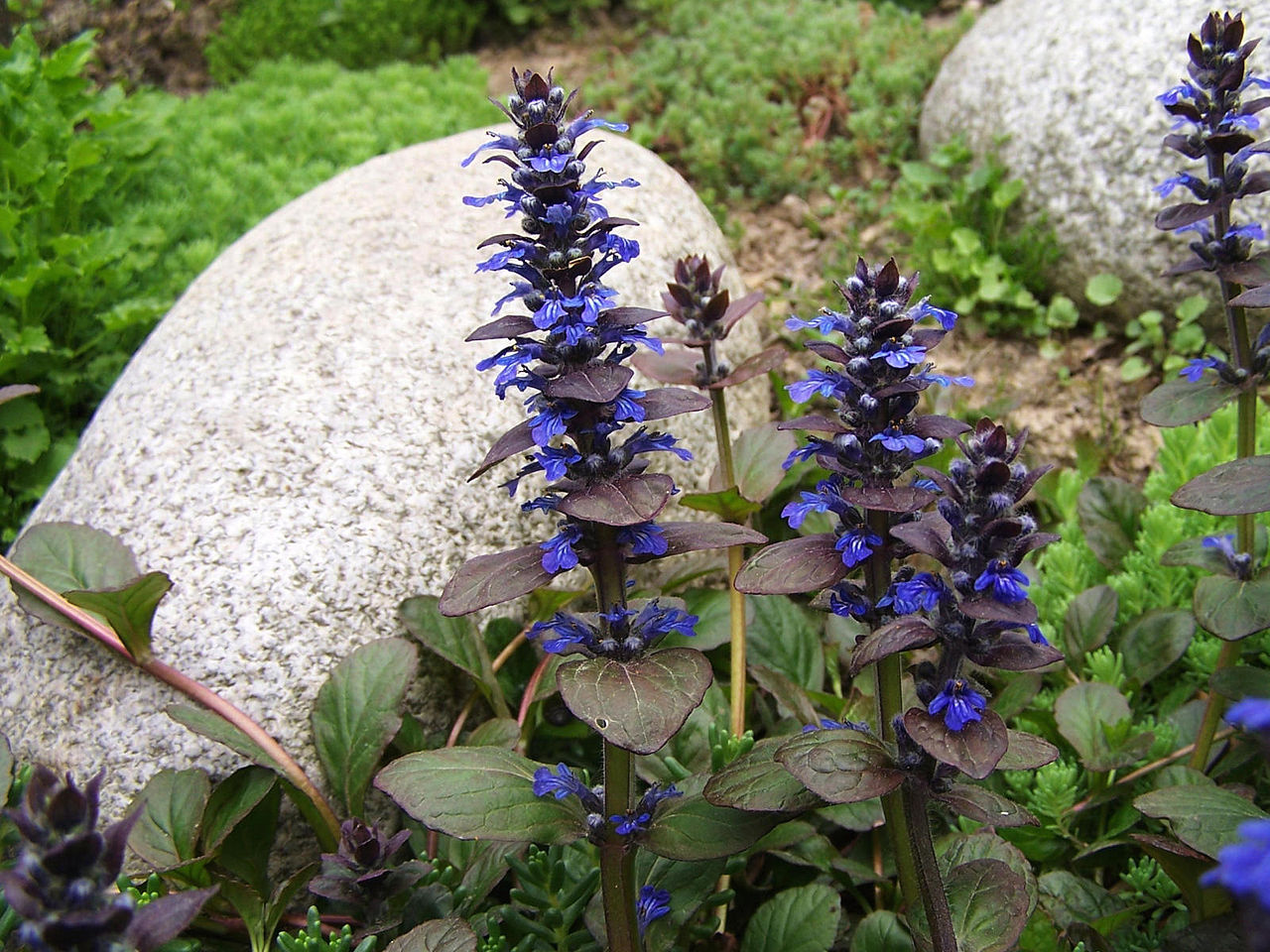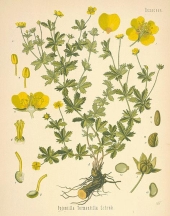https://southernappalachianherbs.blogspot.com/2021/08/trumpeting-nearly-forgotten-bugle.html
Trumpeting The Nearly Forgotten Bugle

Bugleweed, Ajuga reptans, is certainly among the most interesting herbal bitters I have yet discovered. For many, Bugle is an attractive ornamental flower. It is mostly known as a ground cover with deep green, blue and purple leaves, but it sends up a blue spike of flowers each spring, signifying that it is a member of the Mint family. Bugle is highly adaptable, growing in full sun to partial shade - it doesn’t like full shade. It grows well in most soil conditions, so long as it gets sufficient water. Unfortunately though, like several Mints, it can spread more than desired. Some consider Bugle a weed.
Not long ago, it was considered one of the most important medicinal herbs. Now, for reasons unknown, few herbalists even know about it. One would think that a bitter that benefits the liver and digestion, that can help heal wounds so effectively that soldiers used to carry it into battle, that is cardio-tonic, slowing and regulating heart rate, lowering blood pressure and calming respiration, that relaxes muscles and helps with sleep… that can be eaten as a salad green, and has a mellowing effect similar to a couple of glasses of wine would be quite popular!
Just how popular was Bugle with herbalists of the past? Consider the words of 14th century Nicholas Culpepper:
This herb belongeth to dame Venus: If the virtues of it make you fall in love with it (as they will if you be wise) keep a syrup of it to take inwardly, an ointment and plaister of it to use outwardly, always by you.
The decoction of the leaves and flowers made in wine, and taken, dissolves the congealed blood in those that are bruised inwardly by a fall, or otherwise is very effectual for any inward wounds, thrusts, or stabs in the body or bowels: and it is an especial help in all wound-drinks, and for those that are liver- grown (as they call it.) It is wonderful in curing all manner of ulcers and sores, whether new or fresh, or old and inveterate yea, gangrenes and fistulas also, if the leaves bruised and applied, or their juice be used to wash and bathe the place, and the same made into a lotion, and some honey and allum, cureth all sores in the mouth and gums, be they never so foul, or of long continuance; and worketh no less powerfully and effectually for such ulcers and sores as happen in the secret parts of men and women. Being also taken inwardly, or outwardly applied, it helpeth those that have broken any bone, or have any member out of joint. An ointment made with the leaves of bugle, scabions and sanicle bruised and boiled in hog's grease, until the herbs be dry, and then strained forth into a pot for such occasions as shall require; it is so singularly good for all sorts of hurts in the body, that none that know its usefulness will be without it.
The truth is, I have known this herb cure some diseases of Saturn, of which I thought good to quote one. Many times such as give themselves much to drinking, are troubled with strange fancies, strange sights in t0he night time, and some with voices, as also with the disease ephialtes, or the mare. I take the reason of this to be (according to Fernelius) a melancholy vapour made thin by excessive drinking strong liquor, so flies up and disturbs the fancy, and breeds imaginations like itself, viz. fearful and troublesome. These I have known cured by taking only two spoonfuls of the syrup of this herb, after supper two hours, when you go to bed. But whether this does it by sympathy or antipathy, is some doubt in astrology. I know there is great antipathy between Saturn and Venus in matter of procreation: yea, such a one that the barrenness of Saturn can be removed by none but Venus; nor the lust of Venus be repelled by none but Saturn; but I am not of opinion this is done this way, and my reason is, because these vapours, though in quality melancholy, yet by their flying upward, seem to be something aerial; therefore I rather think it is done by sympathy; Saturn being exalted in Libra, in the house of Venus.
Gerard, writing a few decades earlier said of Bugle:
A. It is commended against inward burstings, and members torn, rent, and bruised: and therefore it is put into potions that serve for nodes, in which it is of such virtue, that it can dissolve & wash away congealed and clotted blood. Ruellius writeth that they commonly say in France, how he needeth neither physician nor surgeon that hath Bugle and Sanicle, for it doth not only cure rotten wounds being inwardly taken, but also applied to them outwardly; it is good for the infirmities of the liver; it taketh away the obstructions, and strengtheneth it.
B. The decoction of Bugle drunken, dissolveth clotted or congealed blood within the body, healeth and maketh sound all wounds of the body, both inward and outward.
C. The same openeth the stoppings of the liver and gall, and is good against the jaundice and fevers of long continuance.
D. The same decoction cureth the rotten ulcers and sores of the mouth and gums.
E. Bugula is excellent in curing wounds and scratches, and the juice cureth the wounds, ulcers and sores of the secret parts, or the herb bruised and laid thereon.
Mrs. Grieves, writing in 1931, explains that the cardio-tonic effect of Bugle is similar to digitalis, but much weaker (and safer) in effect:
Medicinal Action and Uses---Bitter, astringent and aromatic.
In herbal treatment, an infusion of this plant is still considered very useful in arresting haemorrhages and is employed in coughs and spitting of blood in incipient consumption and also in some biliary disorders, a wineglassful of the infusion - made from 1 OZ. of the dried herb to 1 pint of boiling water - being given frequently.
In its action, it rather resembles digitalis, lowering the pulse and lessening its frequency, it allays irritation and cough, and equalizes the circulation and has been termed 'one of the mildest and best narcotics in the world.' It has also been considered good for the bad effects of excessive drinking.
Green (Universal Herbal, 1832) gives as his opinion that
'the leaves may be advantageously used in fluxes and disorders of that kind as they do not, like many other plants of the same value, produce costiveness, but rather operate as gentle laxatives.'
He states that a decoction of the herb has been employed for quinsy on the Continent, where the herb has been more employed as a remedy than in this country.
The roots have by some authorities been considered more astringent than the rest of the plant.
It may be that the digitalis-like compounds Bugle contains caused it to fall out of favor. Plants for A Future includes a warning with its listing of the herb’s medicinal uses:
Bugle has a long history of use as a wound herb and, although little used today, it is still considered very useful in arresting haemorrhages and is also used in the treatment of coughs and spitting of blood in incipient consumption. The plant contains digitalis-like substances (these are commonly found in Digitalis species and are used in treating heart complaints) and is thought to possess heart tonic properties. It has also been considered good for the treatment of excessive alcohol intake. The whole plant is aromatic, astringent and bitter. The plant is usually applied externally. It is harvested as it comes into flower in late spring and dried for later use. It is also commonly used fresh in ointments and medicated oils. A homeopathic remedy is made from the whole plant. It is widely used in various preparations against throat irritations and especially in the treatment of mouth ulcers. The plant is said to be a narcotic hallucinogen that is known to have caused fatalities.
So, we must heed the warning… although, I have not found it to be hallucinogenic or strongly narcotic. As I said, eating an entire spike of Bugle has no more effect on me than a glass or two of wine. It is too bitter to eat more. I suppose though, if one were determined to eat enough or take enough tincture to really get stoned, it could be dangerous. Anything that affects the heart should be treated with respect. On the other hand though, if this herb is as healing to the alcohol damaged liver as the historic accounts of herbalists would lead us to believe, the narcotic properties of this herb may well be a boon if it could be used as a substitute for alcohol. My own experimentation with Bugle indicates that it could have such potential.
Bugle is similar in bitterness to radicchio, dandelion or chicory. I found that chopping it finely with a few other aromatic herbs - basil, mint, chives, whatever you have fresh on hand - and serving it as part of a salad mixed with more mild and sweet lettuces gave a wonderful balance. Its leaves are a bit tough compared to softer salad greens, so the chopping helped with texture. The addition of onions and garlic, home grown tomatoes and cucumbers, celery, carrot salt and pepper made a wonderful salad base. With the addition of some blanched beans or asparagus, capers or olives, bacon, cheese, sardines, smoked fish, grilled beef and/or boiled eggs, and either a homemade blue cheese dressing or mustardy vinaigrette, it made a delicious salad. Served with some homemade, buttered, sourdough bread and a glass oof good wine, such salads make an excellent lunch… and are quite conducive to a post-lunch nap.
“Moderation in all things” is the key to health.
Author: Judson Carroll. Judson Carroll is an Herbalist from the Blue Ridge Mountains of North Carolina. His weekly articles may be read at
http://southernappalachianherbs.blogspot.com/
His weekly podcast may be heard at: www.spreaker.com/show/southern-appalachian-herbs
He offers free, weekly herb classes:
https://rumble.com/c/c-618325
Buy his new book:
https://py.pl/d1YsC
Read about Look Up: The Medicinal Trees of the American South, An Herbalist's Guide:
https://southernappalachianherbs.blogspot.com/2021/06/paypal-safer-easier-way-to-pay-online.html
Don't forget about The Herbs and Weeds of Fr. Johannes Künzle.
Click here to read about The Herbs and Weeds of Fr. Johannes Künzle:
https://southernappalachianherbs.blogspot.com/2021/05/announcing-new-book-herbs-and-weeds-of.html
Disclaimer
The information on this site is not intended to diagnose or treat any disease or condition. Nothing on this site has been evaluated or approved by the FDA. I am not a doctor. The US government does not recognize the practice of herbal medicine and their is no governing body regulating herbalists. Therefore, I'm just a guy who studies herbs. I am not offering any advice. I won't even claim that anything I write is accurate or true! I can tell you what herbs have "traditionally been used for." I can tell you my own experience and if I believe an herb helped me. I cannot, nor would I tell you to do the same. If you use any herb I, or anyone else, mentions you are treating yourself. You take full responsibility for your health. Humans are individuals and no two are identical. What works for me may not work for you. You may have an allergy, sensitivity or underlying condition that no one else shares and you don't even know about. Be careful with your health. By continuing to read my blog you agree to be responsible for yourself, do your own research, make your own choices and not to blame me for anything, ever.

 4
4










